新标准版 小学英语--一般现在时态
(完整版)小学一般现在时-过去式-现在进行时-将来时讲解

四种时态的比较.不规则动词过去式:原形过去式原形过去式原形过去式原形过去式sweep swept teach taught have had go went keep kept think thought do did find found sleep slept buy bought eat ate say said feel felt drink drank is/am was take took read read give gave are were mean meantput put sing sang drive drove meet met cut cut begin began speak spoke make made let let ring rang write wrote see saw fly flew run ran ride rode come came draw drew sit sat hear heard tell toldgrow grew learn learned/learntget got know knew一、用动词的适当形式填空1. My parents _______ (come) from Shandong.2. Sam _______(not like) playing computer games.3. The beautiful girl _______(wear) glasses.4. The Zhang family _______(live) in a flat in Nanjing.5. My father likes _______(read) newspapers after work.6. What _______her classmates _______(call) her teacher?7. _______ you _______(love) each other in your family?8. _______(be) your cousin very clever at maths?9. She is good at dancing. She ________ (sing) very well, too.11. Amy ________(take) her dog for a walk every afternoon.12. Mr. Li ________(not teach) us maths this term. (学期)13. Mr. Chen ________(not like) tea. He ________(enjoy) drinking coffee.14. ________ your father often ________(play) tennis ?No, he loves ________(read) newspapers.15. Everyone in our class ________(like) P.E. a lot.16. Who else ________(want) to come to Millie’s party? I ________.17. Many of them ________(work) hard at their lessons. They _____ (be) cl ever at them.18. What _______ Mary _______(have) for breakfast ?She _______(have) an egg and a glass of milk.19. Our school ________(be) a big nice school. And our teacher ______(be ) a good teacher.20. Simon and Daniel ________(be) American.二、句型转换。
小学英语常见四种时态

小学英语常见四种时态一、一般现在时:动词+S1.特殊情况:(1)sh 、ch、o结尾的+es例如:wash_(wash es) watch_(watch es) do_(do es)(2)(2)以y结尾的:把y变成i +es例如:study——(stud ies)2.用单词的正确形式填空:1)Mike does (do) his homework every day.2)My grandma watches (watch)TV every day.3)I often listen (listen)to the misic in the evening.二、现在进行时:动词+ing1.特殊情况:(1)以e结尾,去掉e,+ing例如:make(making) come(coming) dance(dancing)(2)双写结尾字母:sit(si tt ing)swim(swi mm ing) run(ru nn ing)2.用单词的正确形式填空:(1)look! li hua and Mike are singing(sing) now.(2)The small bear is climbing(climb)the tree.(3)My brother is making(make) kites.(4)Lily is sitting (sit) on the chair.三、一般过去时:动词+ed1.特殊情况:(1)有e结尾的,直接+ d例如:like(liked) live(lived)(2)有y结尾的,把y变成+ed 例如:cry(cried)study(studied)(3)不规则变化eat(ate) get(got) see(saw) spend(spent) do(did) teach(taught) win(won) write(wrote) buy (bought) swim(swam)go(went) meet(met) are(were) is(was) am(was)2.用单词的正确形式填空:(1).Did you water the flower yesterday.(2)L i Hua went(go) for a walk last Sunday.(3)M ike didn’t finish (finish)his homework yesterday.(4)I picked apples on the tree last month.四、一般将来时:(1)Shall/will +动词原形(shall只能用于第一人称I /we shall)(2)be going to +动词原形(表示打算做什么)be going to+地点(表示准备去)例如:1.I am going to see a film tomrrow.2There will be a party in our school3.Mike will visit his grandpa next week.。
(完整版)小学英语语法_四大时态(可编辑修改word版)
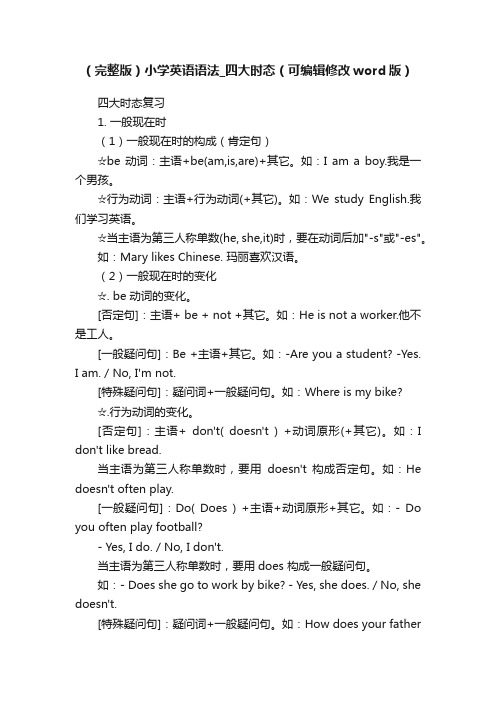
(完整版)小学英语语法_四大时态(可编辑修改word版)四大时态复习1. 一般现在时(1)一般现在时的构成(肯定句)☆be 动词:主语+be(am,is,are)+其它。
如:I am a boy.我是一个男孩。
☆行为动词:主语+行为动词(+其它)。
如:We study English.我们学习英语。
☆当主语为第三人称单数(he, she,it)时,要在动词后加"-s"或"-es"。
如:Mary likes Chinese. 玛丽喜欢汉语。
(2)一般现在时的变化☆. be 动词的变化。
[否定句]:主语+ be + not +其它。
如:He is not a worker.他不是工人。
[一般疑问句]:Be +主语+其它。
如:-Are you a student? -Yes.I am. / No, I'm not.[特殊疑问句]:疑问词+一般疑问句。
如:Where is my bike?☆.行为动词的变化。
[否定句]:主语+ don't( doesn't ) +动词原形(+其它)。
如:I don't like bread.当主语为第三人称单数时,要用doesn't 构成否定句。
如:He doesn't often play.[一般疑问句]:Do( Does ) +主语+动词原形+其它。
如:- Do you often play football?- Yes, I do. / No, I don't.当主语为第三人称单数时,要用does 构成一般疑问句。
如:- Does she go to work by bike? - Yes, she does. / No, she doesn't.[特殊疑问句]:疑问词+一般疑问句。
如:How does your fathergo to work?*动词+s 的变化规则1.一般情况下,直接加-s,如:cook-cooks, milk-milks2.以s. x. sh. ch. o 结尾,加-es,如:guess-guesses, wash-washes, watch-watches, go-goes3.以“辅音字母+y”结尾,变y 为i, 再加-es,如:study-studies2. 现在进行时(1)一般现在时的构成:be(am,is, are)+ 动词的ing 形式。
小学英语语法时态-一般现在时 讲解与练习

小学英语语法时态讲解与归纳—一般现在时一、一般现在时:1.表示事物或人物的特征、状态。
如:The sky is blue.天空是蓝色的。
2.表示经常性或习惯性的动作。
如:I get up at six every day.我每天六点起床。
3.表示客观现实。
如:The earth goes around the sun.地球绕着太阳转。
二. 构成及变化1.be动词的变化。
肯定句:主语+be(am,is,are)+其它。
如:I am a boy.我是一个男孩。
否定句:主语+ be + not +其它。
如:He is not a worker.他不是工人。
一般疑问句:Be +主语+其它。
如:-Are you a student? -Yes. I am. / No, I'm not.特殊疑问句:疑问词+一般疑问句。
如:Where is my bike?2. 行为动词的变化。
当主语为第一,二人称及复数时,助动词为do肯定句:主语+动词原形(+其它)。
如:We often play basketball after school. 否定句:主语+ don't+动词原形(+其它)。
如:we don’t play basketball after school.一般疑问句:Do +主语+动词原形+其它?如:Do you often play basketball after school l? Yes, we do. / No, we don't.特殊疑问句:疑问词+以do开头的一般疑问句?如:What do you often do after school ?3、当主语为第三人称单数时,助动词为does肯定句:主语+动词三单式(+其它)。
如:He swims well.否定句:主语+ doesn’t+动词原形(+其它)。
如:He doesn’t swim well..一般疑问句:Does +主语+动词原形+其它。
新标准版小学英语一般现在时态精品PPT课件

结束语
当你尽了自己的最大努力时,失败也是伟大的, 所以不要放弃,坚持就是正确的。
When You Do Your Best, Failure Is Great, So Don'T Give Up, Stick To The End 演讲人:XXXXXX 时 间:XX年XX月XX日
一般现在时
一般现在时表示或习 惯性的动作,也可表示现 在的状态或主语具备的 性格和等。
一般现在时
(肯定句)
在一般现在时中,句 中有be动词或情态动词 (can等)时,be动词要 随主语而相应改变,情态 动词不变。 例如
一般现在时 (肯定句)
1、I am a teacher. 2、He is a student. 3、You are a boy. 4、I can swim.
特殊疑问句
没有be动词或情态动 词构成:疑问词+do (does)+主语+动词 原形+其它 例如
特殊疑问句(时间)
单数第三人称: He goes to school at seven.
W 非单he数n 第d三oe人s 称he:go to school?
I go to school at six. When do you go to school?
一般现在时 (疑问句)
句中没有be动词或情态动词时,
主语为非第三人称单数,一般疑问句
在句首加do,句子中动词用原形。主
语为第三人称单数,一般疑问句在句
首加does,句子中原有动词用原形;
Some变any.
例如
一般现在时 (一般疑问句)
1、I go to school by bus. 疑问句: Do you go to school by bus. 2、He goes to school by bus. 疑问句: Does he go to school by bus.
新标准英语之一般现在时态练习题

用动词的适当形式填空
5.____ (be)there a fly (苍蝇) on the table just now?
5. What time _d_o_e_s__ the shop _c_l_o_s_e_ (close)? It _c_lo__s_es(close) at
nine o'clock in the evening.
6. He _g_o_s_e__(go) to school by bus
every day.
4. What _d_o_e_s__he usually_d_o____ (do) after school?
5. Danny_s_t_u_d_ie_s__(stnd Art at school.
6. Mike sometimes g__o_e_s_(go) to the park with his sister.
10. What time _d_o_e_s__ his mother _d_o___(do) the housework?
改句子 1. Do you often play football after school? (肯定回答)
Yes, I do. 2. I have many books. (改为否定 句)
1. teaches, is, talks, talking, is talking
2. Listen! Whoi_s_r_e_a_d_in(gread)
English? Han Meimei is. She often r_e_a_d_s__(read) English in
the evening. 3. Where a__re____ (be) Tom and Jim? They a_r_e__p_l_a_y_in_g_ (play) football. I_s_____ LinTao _p_l_a_y_in_g(play) footballs too? No, he i_s_m__e_n_ding (mend) his bike.
小学英语语法-一般现在时详细讲解

小学英语语法-一般现在时详细讲解一般现在时是英语语法中最基础也是最常用的时态之一。
它表示的是习惯性、经常性和普遍性的行为或状态。
在本文中,我将详细介绍一般现在时的形式、用法和注意事项。
一、一般现在时的形式一般现在时的肯定句的基本结构是:主语+谓语动词+其他。
谓语动词在第三人称单数形式时要加上-s或-es。
例如:- I eat breakfast every morning.(我每天早上吃早饭。
)- She goes to school by bus.(她坐公共汽车去学校。
)否定句的结构是:主语+do not/does not+动词原形+其他。
例如:- I do not like coffee.(我不喜欢咖啡。
)- He does not play football.(他不踢足球。
)疑问句的结构是:Do/Does+主语+动词原形+其他?例如:- Do you like ice cream?(你喜欢冰淇淋吗?)- Does she go to the park every weekend?(她每个周末去公园吗?)二、一般现在时的用法第1页/共4页1. 表示习惯或经常性的动作:- I write in my diary every night.(我每天晚上写日记。
)- They play basketball every Sunday.(他们每个星期天打篮球。
)2. 表示客观事实、自然规律或科学真理:- Water boils at 100 degrees Celsius.(水在100摄氏度时煮沸。
)- The sun rises in the east.(太阳从东方升起。
)3. 表示感觉、想法和喜好:- I love chocolate.(我喜欢巧克力。
)- He hates to wake up early.(他讨厌早起。
)4. 表示现时状态或现时临时的动作:- I am a student.(我是一个学生。
小学英语的四种时态知识点
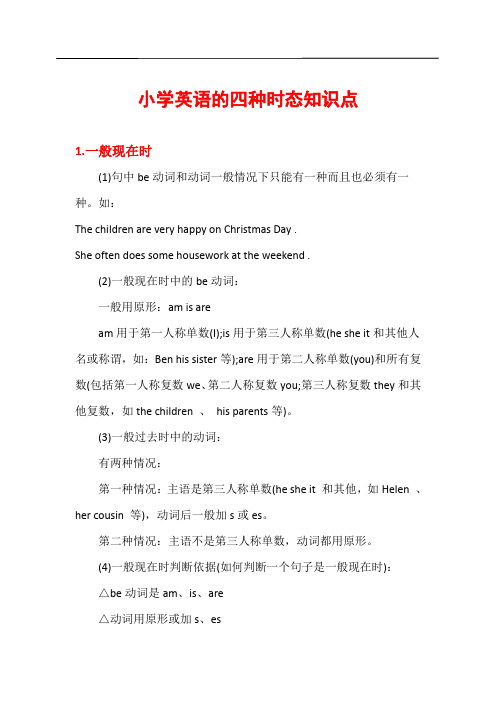
小学英语的四种时态知识点1.一般现在时(1)句中be动词和动词一般情况下只能有一种而且也必须有一种。
如:The children are very happy on Christmas Day .She often does some housework at the weekend .(2)一般现在时中的be动词:一般用原形:am is aream用于第一人称单数(I);is用于第三人称单数(he she it和其他人名或称谓,如:Ben his sister等);are用于第二人称单数(you)和所有复数(包括第一人称复数we、第二人称复数you;第三人称复数they和其他复数,如the children 、his parents等)。
(3)一般过去时中的动词:有两种情况:第一种情况:主语是第三人称单数(he she it 和其他,如Helen 、her cousin 等),动词后一般加s或es。
第二种情况:主语不是第三人称单数,动词都用原形。
(4)一般现在时判断依据(如何判断一个句子是一般现在时):△be动词是am、is、are△动词用原形或加s、es△没有时间状语或有usually、often、everyday、sometimes等不是具体的时间(5)有用的的依据:Be动词是is、am ←→名词用原形(这里包括可数名词的单数和不可数名词)Be动词是are ←→名词加s或es动词加s或es ←→主语是第三人称单数动词用原形←→主语不是第三人称单数(6)情态动词:我们现在学过的情态动词有:can、must、should、would。
情态动词后动词总是用原形。
(不受其他任何条件影响)2.一般过去时(1)句中be动词和动词一般情况下只能有一种而且也必须有一种。
如:The girls were on the grass just now .They visited my parents last weekend .(2)一般过去时中的be动词:一般用过去式:was werewas用于第一人称单数(I)和第三人称单数(he she it和其他人名或称谓,如:Ben 、his sister等);were用于第二人称单数(you)和所有复数(包括第一人称复数we、第二人称复数you;第三人称复数they 和其他复数,如the children 、his parents等)。
小学英语语法时态一般现在时
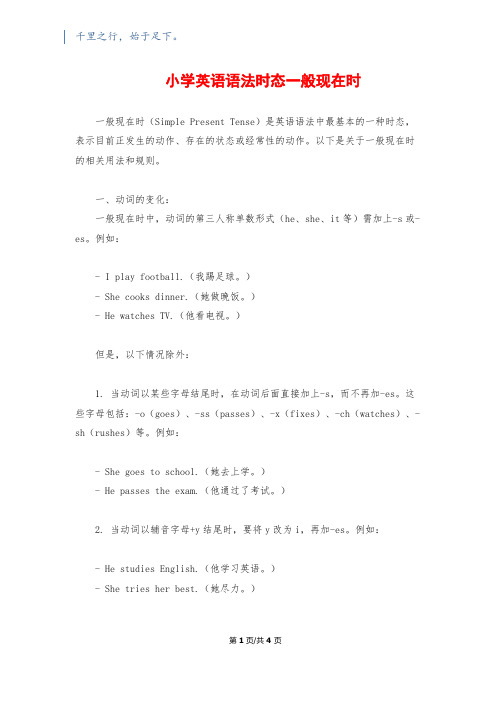
小学英语语法时态一般现在时一般现在时(Simple Present Tense)是英语语法中最基本的一种时态,表示目前正发生的动作、存在的状态或经常性的动作。
以下是关于一般现在时的相关用法和规则。
一、动词的变化:一般现在时中,动词的第三人称单数形式(he、she、it等)需加上-s或-es。
例如:- I play football.(我踢足球。
)- She cooks dinner.(她做晚饭。
)- He watches TV.(他看电视。
)但是,以下情况除外:1. 当动词以某些字母结尾时,在动词后面直接加上-s,而不再加-es。
这些字母包括:-o(goes)、-ss(passes)、-x(fixes)、-ch(watches)、-sh(rushes)等。
例如:- She goes to school.(她去上学。
)- He passes the exam.(他通过了考试。
)2. 当动词以辅音字母+y结尾时,要将y改为i,再加-es。
例如:- He studies English.(他学习英语。
)- She tries her best.(她尽力。
)第1页/共4页3. 当动词以-e结尾时,只需加上-s。
例如:- They write letters.(他们写信。
)- He can dance.(他会跳舞。
)二、用法:1. 描述客观事实或经常性动作:一般现在时常用于描述客观事实或经常性动作。
例如:- Water boils at 100 degrees Celsius.(水沸腾的温度是100摄氏度。
)- I usually go to bed at 10 o'clock.(我通常在10点钟上床睡觉。
)2. 描述现阶段的状态:一般现在时还可用来描述现阶段的状态或对现实情况的评论。
例如:- They live in New York.(他们住在纽约。
)- She looks tired.(她看起来很累。
小学英语之时态——一般现在时
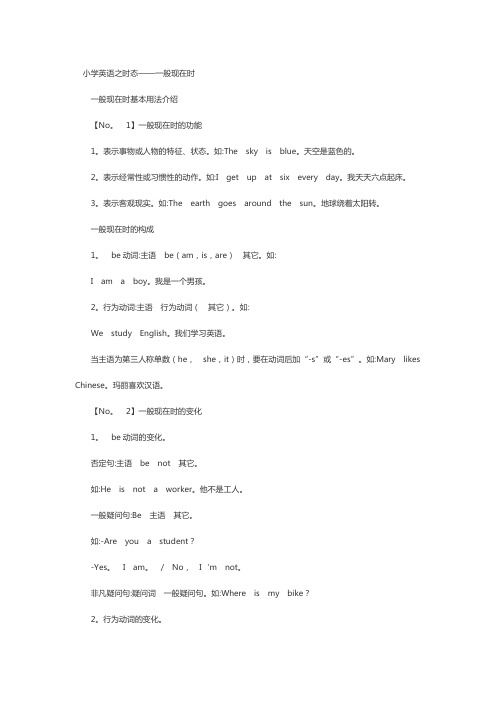
小学英语之时态——一般现在时一般现在时基本用法介绍【No。
1】一般现在时的功能1。
表示事物或人物的特征、状态。
如:The sky is blue。
天空是蓝色的。
2。
表示经常性或习惯性的动作。
如:I get up at six every day。
我天天六点起床。
3。
表示客观现实。
如:The earth goes around the sun。
地球绕着太阳转。
一般现在时的构成1。
be动词:主语be(am,is,are)其它。
如:I am a boy。
我是一个男孩。
2。
行为动词:主语行为动词(其它)。
如:We study English。
我们学习英语。
当主语为第三人称单数(he,she,it)时,要在动词后加“-s”或“-es”。
如:Mary likes Chinese。
玛丽喜欢汉语。
【No。
2】一般现在时的变化1。
be动词的变化。
否定句:主语be not 其它。
如:He is not a worker。
他不是工人。
一般疑问句:Be 主语其它。
如:-Are you a student?-Yes。
I am。
/ No,I‘m not。
非凡疑问句:疑问词一般疑问句。
如:Where is my bike?2。
行为动词的变化。
否定句:主语don’t(doesn‘t )动词原形(其它)。
如:I don’t like bread。
当主语为第三人称单数时,要用doesn‘t构成否定句。
如:He doesn’t often play。
一般疑问句:Do(Does )主语动词原形其它。
如:- Do you often play football?- Yes,I do。
/ No,I don‘t。
当主语为第三人称单数时,要用does构成一般疑问句。
如:- Does she go to work by bike?- Yes,she does。
/ No,she doesn’t。
动词s的变化规则1.一般情况下,直接加-s,如:cook-cooks,milk-milks2.以s。
小学英语四种时态
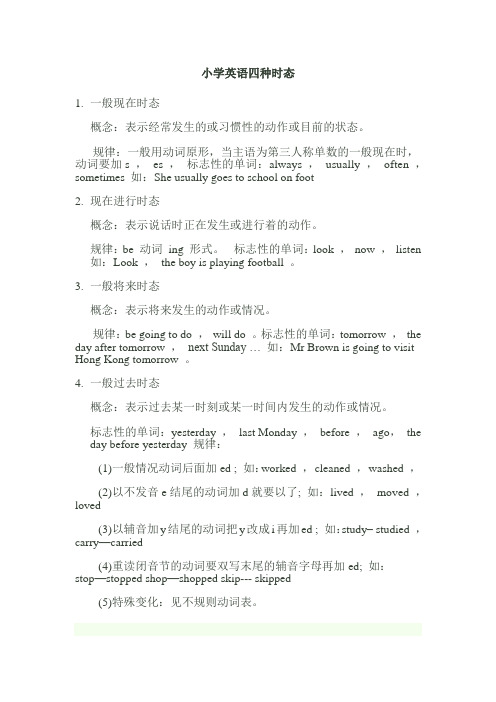
小学英语四种时态1.一般现在时态概念:表示经常发生的或习惯性的动作或目前的状态。
规律:一般用动词原形,当主语为第三人称单数的一般现在时,动词要加s ,es ,标志性的单词:always ,usually ,often ,sometimes 如:She usually goes to school on foot2.现在进行时态概念:表示说话时正在发生或进行着的动作。
规律:be 动词ing 形式。
标志性的单词:look ,now ,listen 如:Look ,the boy is playing football 。
3.一般将来时态概念:表示将来发生的动作或情况。
规律:be going to do ,will do 。
标志性的单词:tomorrow ,the day after tomorrow ,next Sunday … 如:Mr Brown is going to visit Hong Kong tomorrow 。
4.一般过去时态概念:表示过去某一时刻或某一时间内发生的动作或情况。
标志性的单词:yesterday ,last Monday ,before ,ago,the day before yesterday 规律:(1)一般情况动词后面加ed ; 如:worked ,cleaned ,washed ,(2)以不发音e结尾的动词加d就要以了; 如:lived ,moved ,loved(3)以辅音加y结尾的动词把y改成i再加ed ; 如:study– studied ,carry—carried(4)重读闭音节的动词要双写末尾的辅音字母再加ed; 如:stop—stopped shop—shopped skip--- skipped(5)特殊变化:见不规则动词表。
小学英语固定搭配Good night 晚安.in the morning 在早上at noon 在中午in the afternoon 在下午in the evening 在傍晚at night 在夜间have/eat breakfast 吃早饭have/eat lunch 吃午饭have/eat supper(dinner) 吃晚饭read a book 读书sing a song 唱歌have a meeting 开会have class 上课have a party 聚会have a competition 竞赛have a sleep 睡觉have a snack 吃零食have a picnic 野餐have a buffet dinner 吃自助餐draw pictures 画画listen to music 听音乐listen to the radio 听收音机learn English 学习英语learn Chinese 学习语文Learn math 学习数学tell stories 讲故事take a walk 散步ask and answer questions 问答问题fly a kite 放风筝ride a bike 骑自行车ride a horse 骑马play computer games 玩电脑游戏play games 做游戏play hide and seek 玩捉迷藏do homework 做作业watch TV 看电视take a shower 洗淋浴take a bath 洗澡open the door 开门open the window 开窗户close the door 关门close the window 关窗户paly football 踢足球/打橄榄球play basketball 打篮球play volleyball 打排球play badminton 打羽毛球play golf 打高尔夫球play bowling 打保龄球play table tennis 打乒乓球play baseball 打棒球play tennis 打网球play soccer 踢足球play hockey 打曲棍球play chess 下棋go fishing 去钓鱼go swimming 去游泳go shopping 去购物go skating 去滑冰go bike-riding/ go cycling 去骑自行车go sking 去滑雪go camping 去野营listen to the news 听新闻read the newspaper 看报read the magazine 看杂志go to school 去上学go home 回家go to the park 去公园go to the zoo 去动物园go to the library 去图书馆go to the hospital 去医院go to the cinema 去电影院go to see a film /movie去看电影get up 起床go to bed 上床go to sleep 去睡觉brush the teeth 刷牙wash the hands 洗手wash the face 洗脸wash clothes 洗衣服air the room 给房间通风make the bed 铺床sweep the floor 扫地mop the floor 拖地clean the room 打扫房间climb the trees 爬树climb the mountains 爬山cook the meals 做饭drink milk/juice/coca cola 喝牛奶/果汁/可乐play the piano 弹钢琴play the violin 拉小提琴play the drum 打鼓play the guitar 弹吉他play the xylophone 弹木琴play the flute 吹笛子play the harp 弹竖琴play the erhu 拉二胡play the zither 弹古筝play the banjo 弹班卓play the trumpet 吹小号stay at home 呆在家里at home 在家at school 在学校at church 在教堂make a cake 做蛋糕take pictures/photos 照相comb hair 梳头发have a haircut 理发go away 走开at the weekend 在周末stand up 起立sit down 坐下New year 元旦Spring Festival 春节Lantern Festival 元宵节Spring Cleaning Day 清明节Dragon Boat Festival 龙舟节International labour day 国际劳动节Trees planting day 植树节Children's day 儿童节Party's day 党的生日Army's day 建军节Teacher's day 教师节National day 国庆节Thanksgiving day 感恩节Chrismas day 圣诞节in the morning 在早上at noon 在中午in the afternoon 在下午in the evening 在傍晚at night 在夜间have/eat breakfast 吃早饭have/eat lunch 吃午饭have/eat supper(dinner) 吃晚饭read a book 读书sing a song 唱歌have a meeting 开会have class 上课have a party 聚会have a competition 竞赛have a sleep 睡觉have a snack 吃零食have a picnic 野餐have a buffet dinner 吃自助餐draw pictures 画画listen to music 听音乐listen to the radio 听收音机learn English 学习英语learn Chinese 学习语文Learn math 学习数学tell stories 讲故事take a walk 散步ask and answer questions 问答问题fly a kite 放风筝ride a bike 骑自行车ride a horse 骑马play computer games 玩电脑游戏play games 做游戏play hide and seek 玩捉迷藏do homework 做作业watch TV 看电视take a shower 洗淋浴take a bath 洗澡open the door 开门open the window 开窗户close the door 关门close the window 关窗户paly football 踢足球/打橄榄球play basketball 打篮球play volleyball 打排球play badminton 打羽毛球play golf 打高尔夫球play bowling 打保龄球play table tennis 打乒乓球play baseball 打棒球play tennis 打网球play soccer 踢足球play hockey 打曲棍球play chess 下棋go fishing 去钓鱼go swimming 去游泳go shopping 去购物go skating 去滑冰go bike-riding/ go cycling 去骑自行车go sking 去滑雪go camping 去野营listen to the news 听新闻read the newspaper 看报read the magazine 看杂志go to school 去上学go home 回家go to the park 去公园go to the zoo 去动物园go to the library 去图书馆go to the hospital 去医院go to the cinema 去电影院go to see a film /movie去看电影get up 起床go to bed 上床go to sleep 去睡觉brush the teeth 刷牙wash the hands 洗手wash the face 洗脸wash clothes 洗衣服air the room 给房间通风make the bed 铺床sweep the floor 扫地mop the floor 拖地clean the room 打扫房间climb the trees 爬树climb the mountains 爬山cook the meals 做饭drink milk/juice/coca cola 喝牛奶/果汁/可乐play the piano 弹钢琴play the violin 拉小提琴play the drum 打鼓play the guitar 弹吉他play the xylophone 弹木琴play the flute 吹笛子play the harp 弹竖琴play the erhu 拉二胡play the zither 弹古筝play the banjo 弹班卓play the trumpet 吹小号stay at home 呆在家里at home 在家at school 在学校at church 在教堂make a cake 做蛋糕take pictures/photos 照相comb hair 梳头发have a haircut 理发go away 走开at the weekend 在周末stand up 起立sit down 坐下New year 元旦Spring Festival 春节Lantern Festival 元宵节Spring Cleaning Day 清明节Dragon Boat Festival 龙舟节International labour day 国际劳动节Trees planting day 植树节Children's day 儿童节Party's day 党的生日Army's day 建军节Teacher's day 教师节National day 国庆节小学英语动词过去式agree 同意agreedask 问askedanswer 回答answeredbecome 成为becamebegin 开始beganbring 带来broughtbuy 买boughtcall 呼叫calledcarry 搬运carriedcatch 抓住caughtcheck 检查checkedclean 清洁cleanedclimb 爬climbedcome 来camecook 煮cookedcut 切cutdance 跳舞danceddo 做diddraw 画drewdrink 喝drankdrive 驾驶droveeat 吃ateenjoy 欣赏enjoyedfeel 感觉feltfly 飞fliedforget 忘记forgotfish 钓鱼fishedget 得到gotgive 给gavego 去wentgrow 成长grewhave 有hadhear 听到heardhelp 帮助helpedjump 跳jumpedkeep 保存keptknow 知道knewlearn 学习learned listen 听listenedlike 喜欢likedlook 看lookedlive 生活livedlove 喜爱lovedmake 做mademeet 遇见metmove 移动moved need 需要needed open 打开opened paint 画paintedpick 摘pickedplay 玩playedplan 计划planned practise 练习practised prefer 更喜欢preferred put 放putread 读readride 骑roderun 跑ransay 说saidsee 看sawsit 坐satskip 跳skippedspeak 说spokestart 开始startedstay 停留stayed sweep 扫sweptstudy 学习studied swim 游泳swamtalk 谈话talkedtake 带去tookteach 教taughtthank 谢谢thanked tell 告诉toldthink 想thought travel 旅游traveledtry 试trieduse 使用used wake 醒来woke walk 走路walked want 想wanted wash 洗washed watch 看watched water 浇水watered wave 挥动waved work 工作worked worry 担心worried write 写wrote小学英语可数名词复数形式1)以y结尾的专有名词,或元音字母+y 结尾的名词变复数时,直接加s变复数。
(完整版)小学一般现在时-过去式-现在进行时-将来时讲解

四种时态的比较.不规则动词过去式:原形过去式原形过去式原形过去式原形过去式sweep swept teach taught have had go went keep kept think thought do did find found sleep slept buy bought eat ate say said feel felt drink drank is/am was take took read read give gave are were mean meantput put sing sang drive drove meet met cut cut begin began speak spoke make made let let ring rang write wrote see saw fly flew run ran ride rode come came draw drew sit sat hear heard tell toldgrow grew learn learned/learntget got know knew一、用动词的适当形式填空1. My parents _______ (come) from Shandong.2. Sam _______(not like) playing computer games.3. The beautiful girl _______(wear) glasses.4. The Zhang family _______(live) in a flat in Nanjing.5. My father likes _______(read) newspapers after work.6. What _______her classmates _______(call) her teacher?7. _______ you _______(love) each other in your family?8. _______(be) your cousin very clever at maths?9. She is good at dancing. She ________ (sing) very well, too.11. Amy ________(take) her dog for a walk every afternoon.12. Mr. Li ________(not teach) us maths this term. (学期)13. Mr. Chen ________(not like) tea. He ________(enjoy) drinking coffee.14. ________ your father often ________(play) tennis ?No, he loves ________(read) newspapers.15. Everyone in our class ________(like) P.E. a lot.16. Who else ________(want) to come to Millie’s party? I ________.17. Many of them ________(work) hard at their lessons. They _____ (be) cl ever at them.18. What _______ Mary _______(have) for breakfast ?She _______(have) an egg and a glass of milk.19. Our school ________(be) a big nice school. And our teacher ______(be ) a good teacher.20. Simon and Daniel ________(be) American.二、句型转换。
一般现在时态(小学英语)

一般现在时态:1.概念:A.目前经常/反复发生的动作B.目前存在的事实2.句子结构:A:主+动原=do+动原B:主+动三单=does+动原3.人称:第一人称(我/我们);第二人称(你/你们)第三人称:除去“我/我们,你/你们”的所有人称3.单复数:单数→一个;复数→不止一个.4.三人称单数:不是你(you)也不是我(I)的另外“一个”.5.动三单:当句子主语是“第三人称”且是“单数”时,谓语动词所采用的形式→动词的三人称单数形式→动三单形式→动三单6. 动三单的变化规则:(1).一般的+es; (2).以s,x,ch,sh,o结尾的+es; (3).以辅音字母+y结尾的:y→i+es (4). have→has(A:拥有; B:助动词,无实义)(注:26个字母分:元音字母Aa,Ee,Ii,Oo,Uu;半元音字母Yy+20个辅音字母)7.隐形助动词: do does(did)do does(did)此处为助动词,无实义. 一般不直接出现在肯定句中,故可称“隐形助动词” do, does (did)也可以是实义动词:“做/干”.8.一般现在时态里没有are is are 等be动词出现,即动原/动三单不和be动词连用.9.变一般问句:助提前(A.译为…吗?B.用Yes/No来回答)10.变否定句:助+not11.目前所学助词动:am , is , are ; do, does, did; have ,has; can一: 写出下列动词的第三人称单数形式(动三单形式):watch____guess___study____ fish____ go____snow____ see____ ride____fly____ come____ swim____ walk____ skip____play____ do____ teach____ have____二:单项选择:1.Does your brother ___the lions? A. likes B. like C.liking2. What colour ___ these trousers? A. am B. is C. are3. My brother ___to school every morning. A. go B. goes C. going4. That woman ____ her bike to work. A. ride B. rides C. riding5. The policeman_____ the farmer. A.don’t know B. not know C. doesn’t know6. His sister ___ math. A. doesn’t like B. doesn’t likes C. don’t likes7. ___your grandpa ____fishing in winter?A. Do; goesB. Does;goC. Do;go8.They ___ kites in autumn. A. flys B. flies C. fly9. My brother and I ___ good friends. A. am B. is C. are10. Lily and Lucy____to school every morning. A. walk B. walks C. doesn’t walk11. Do your father and mother watch TV in the evening?A. Yes, they areB. No, they doC. Yes, they do12. Does your brother know the driver?A. Yes, he doesn’tB. No, he don’tC. Yes, he does13. I _____the birthday present. A. am not B. don’t like C. doesn’t like14. The cat ___fish very much. A. love B. lo ves C. don’t likes15. What ___she ___ on Fridays? A. does; do B. does, does C. do,do三:用所给词的正确形式填空。
小学英语语法_一般现在时详细讲解

千里之行,始于足下。
学校英语语法_一般现在时具体讲解一般现在时(Simple Present Tense)是英语中最基本的时态之一,用来表达经常性或习惯性的动作、客观事实、常规活动等。
以下是一般现在时的具体讲解。
1. 构成:主语 + 动词原形(第三人称单数要在动词后加-s)+ 其他。
例如:- I play soccer on weekends.(我周末踢足球。
)- He watches TV every evening.(他每天晚上看电视。
)2. 主语:一般现在时的主语可以是第一人称、其次人称或第三人称。
例如:- I go to school every day.(我每天去上学。
)- You like ice cream.(你宠爱冰淇淋。
)- She plays the piano well.(她弹得很好。
)3. 动词的变化:- 第三人称单数一般在动词后面加上-s或-es。
例如:he/she/itplays(he plays,she plays,it plays),he/she/it watches(he watches,she watches,it watches)。
- 一般现在时的否定形式是在动词前面加上do not(don’t)或does not(doesn’t)。
例如:I do not dance(我不跳舞),She does not like coffee(她不宠爱咖啡)。
- 一般现在时的疑问形式是把do或does放在主语前面。
例如:Do you play tennis?(你打网球吗?),Does she go to the gym?(她去健身房吗?)4. 使用场景:第1页/共2页锲而不舍,金石可镂。
- 表达经常性或习惯性的动作。
例如:I eat breakfast every morning.(我每天早上吃早餐。
)- 表达客观事实、普遍真理等。
例如:The sun rises in the east.(太阳从东方升起。
小学英语动词的四种时态
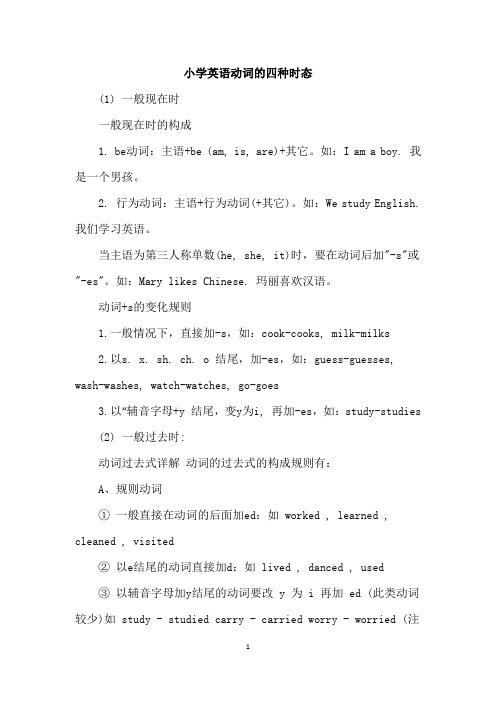
小学英语动词的四种时态(1) 一般现在时一般现在时的构成1. be动词:主语+be (am, is, are)+其它。
如:I am a boy. 我是一个男孩。
2. 行为动词:主语+行为动词(+其它)。
如:We study English. 我们学习英语。
当主语为第三人称单数(he, she, it)时,要在动词后加"-s"或"-es"。
如:Mary likes Chinese. 玛丽喜欢汉语。
动词+s的变化规则1.一般情况下,直接加-s,如:cook-cooks, milk-milks2.以s. x. sh. ch. o 结尾,加-es,如:guess-guesses, wash-washes, watch-watches, go-goes3.以“辅音字母+y 结尾,变y为i, 再加-es,如:study-studies(2) 一般过去时:动词过去式详解动词的过去式的构成规则有:A、规则动词①一般直接在动词的后面加ed:如 worked , learned , cleaned , visited②以e结尾的动词直接加d:如 lived , danced , used③以辅音字母加y结尾的动词要改 y 为 i 再加 ed (此类动词较少)如 study - studied carry - carried worry - worried (注意play、stay不是辅音字母加 y ,所以不属于此类)④双写最后一个字母(此类动词较少)如 stoppedB、不规则动词(此类词并无规则,须熟记)小学阶段要记住以下动词的原形和过去式:sing - sang , eat - ate ,see - saw , have - had , do - did , go - went , take - took , buy - bought , get - got , read - read ,fly - flew , am/is - was ,are - were , say - said , leave - left , swim - swam , tell - told , draw - drew , come - came , lose - lost , find - found , drink - drank , hurt - hurt , feel - felt(3) 一般将来时:基本结构:①be going to + do;②will+ do. be going to = willI am going to go swimming tomorrow(明天). = I will go swimming tomorrow.(4) 现在进行时: am,is,are+动词现在分词动词现在分词详解动词的ing形式的构成规则:①一般的直接在后面加上ing , 如doing , going , working , singing , eating②以e 结尾的动词,要先去e再加ing,如having , writing③双写最后一个字母的(此类动词极少)有:running ,swimming , sitting , getting。
小学英语五种时态
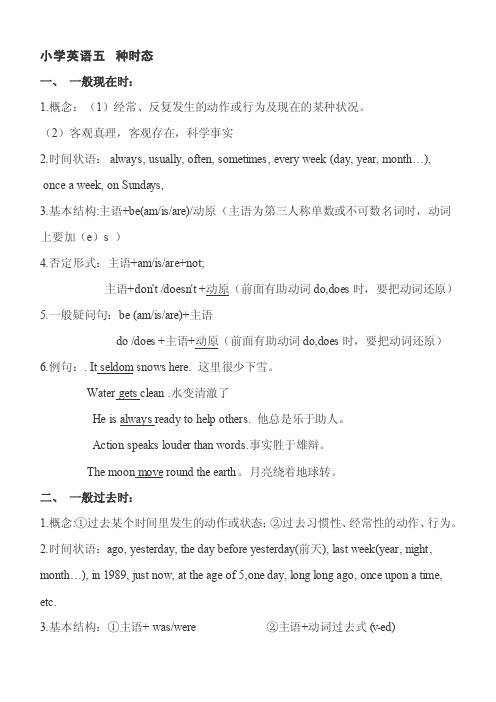
小学英语五种时态一、一般现在时:1.概念:(1)经常、反复发生的动作或行为及现在的某种状况。
(2)客观真理,客观存在,科学事实2.时间状语: always, usuall y, often, someti mes, everyweek (day, year, month…),once a week, on Sunday s,3.基本结构:主语+be(am/is/are)/动原(主语为第三人称单数或不可数名词时,动词上要加(e)s )4.否定形式:主语+am/is/are+not;主语+don't /doesn't +动原(前面有助动词do,does时,要把动词还原)5.一般疑问句:be (am/is/are)+主语do /does +主语+动原(前面有助动词do,does时,要把动词还原)6.例句:. It seldom snowshere. 这里很少下雪。
Watergets clean.水变清澈了He is always readyto help others. 他总是乐于助人。
Action speaks louder than words.事实胜于雄辩。
The moon move roundthe earth。
月亮绕着地球转。
二、一般过去时:1.概念:①过去某个时间里发生的动作或状态;②过去习惯性、经常性的动作、行为。
2.时间状语:ago, yester day, the day before yester day(前天), last week(year, night, month…),in1989, just now, at the age of 5,one day, long long ago, once upon a time, etc.3.基本结构:①主语+ was/were ②主语+动词过去式(v-ed)4.否定形式:①主语+ was/were+not ②主语+didn't+动原5.一般疑问句:①Was/Were+主语…②Did+主语+动原…6.例句:She oftencame to help us in thosedays. (过去一段时间内)I didn't know you were so busy. (过去某个时间点)三、一般将来时:1. 概念:表示将要发生的动作或存在的状态及打算、计划或准备做某事。
小学英语三种时态总结
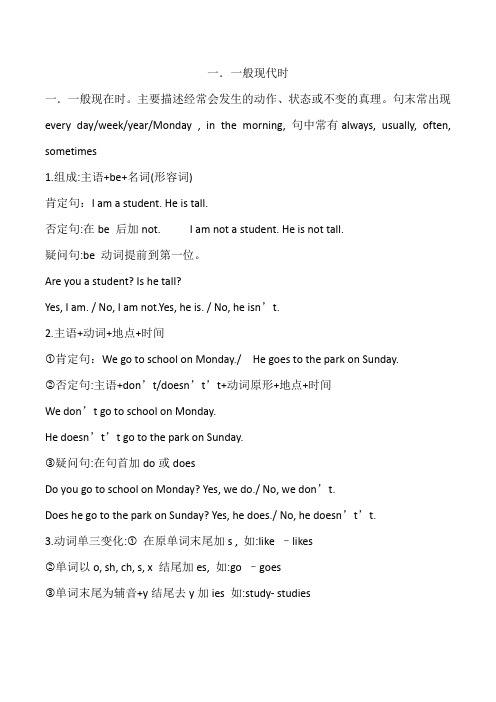
一.一般现代时一.一般现在时。
主要描述经常会发生的动作、状态或不变的真理。
句末常出现every day/week/year/Monday , in the morning, 句中常有always, usually, often, sometimes1.组成:主语+be+名词(形容词)肯定句:I am a student. He is tall.否定句:在be 后加not. I am not a student. He is not tall.疑问句:be 动词提前到第一位。
Are you a student? Is he tall?Yes, I am. / No, I am not.Yes, he is. / No, he isn’t.2.主语+动词+地点+时间①肯定句:We go to school on Monday./ He goes to the park on Sunday.②否定句:主语+don’t/doesn’t’t+动词原形+地点+时间We don’t go to school on Monday.He doesn’t’t go to the park on Sunday.③疑问句:在句首加do或doesDo you go to school on Monday? Yes, we do./ No, we don’t.Does he go to the park on Sunday? Yes, he does./ No, he doesn’t’t.3.动词单三变化:①在原单词末尾加s , 如:like –likes②单词以o, sh, ch, s, x 结尾加es, 如:go –goes③单词末尾为辅音+y结尾去y加ies 如:study- studies二.现在进行时现在进行时:主要叙述正在发生的事情。
句末常出现now, 句首常出现look, listen,in this photo组成:主语+be +动词ing形式I am reading English. /They are swimming. /He is playing football.否定句:在be后加not. I am not reading English. / They are not swimming. He is not playing football.疑问句:将be 放到第一位。
小学英语常见的四种时态

小学常见的四种时态1.一般现在时:1)概念:经常、反复发生的动作或行为及现在的某种状况。
2)时间状语: always, usually, often, sometimes, every week (day, year, month …), once a week, etc.3)基本结构:①be动词;②行为动词4)否定形式:①am / is / are + not;②此时态的谓语动词若为行为动词,则在其前加don’t,如主语为第三人称单数,则用doesn’t,同时还原行为动词。
5)一般疑问句:①把be动词放于句首;②用助动词do提问,如主语为第三人称单数,则用does,同时,还原行为动词。
2.一般过去时:1)概念:过去某个时间里发生的动作或状态;过去习惯性、经常性的动作、行为。
2)时间状语:…ago, yesterday, the day before yesterday, last week (year, night, month …), in 1989, just now...3)基本结构:①be动词;②行为动词4)否定形式:①was / were + not;②在行为动词前加didn’t,同时还原行为动词。
5)一般疑问句:①was或were放于句首;②用助动词do的过去式did 提问,同时还原行为动词。
3.现在进行时:1)概念:表示现阶段或说话时正在进行的动作及行为。
2)时间状语:now, at this time, these days, listen, look, etc.3)基本结构:am / is / are + doing4)否定形式:am / is / are + not + doing.5)一般疑问句:把be动词放于句首。
4.一般将来时:1)概念:表示将要发生的动作或存在的状态及打算、计划或准备做某事。
2)时间状语:tomorrow, next day (week, month, year, Sunday, Saturday …), soon, etc.3)基本结构:①am / is / are going to + do;②will / shall + do ③ want to + do4)重点讲授一般将来时在对话中的使用。
一般现在时态变化规则

一般现在时态变化规则一般现在时态是英语中最基础和最常用的时态之一,用来描述经常性的、习惯性的或普遍性的动作、状态或事实。
它有以下几个变化规则。
1. 一般现在时态的肯定句结构:主语 + 动词原形(第三人称单数加-s)+ 其他成分。
例如:- I play basketball every weekend.(我每个周末打篮球。
)- She works in a hospital.(她在医院工作。
)2. 一般现在时态的否定句结构:主语 + do not / does not + 动词原形 + 其他成分。
例如:- They do not like spicy food.(他们不喜欢辣食。
)- He does not watch TV in the morning.(他早上不看电视。
)3. 一般现在时态的疑问句结构:Do / Does + 主语 + 动词原形 + 其他成分?例如:- Do you speak English?(你会说英语吗?)- Does she live in London?(她住在伦敦吗?)4. 一般现在时态的特殊用法:(1)表示客观真理或普遍事实。
例如:- The sun rises in the east.(太阳从东方升起。
)- Water boils at 100 degrees Celsius.(水在100摄氏度沸腾。
)(2)表示经常性或习惯性的动作。
例如:- I often go to the gym after work.(我经常下班后去健身房。
)- He brushes his teeth twice a day.(他每天刷两次牙。
)(3)表示现阶段的状况或状态。
例如:- I am currently studying at university.(我目前正在大学学习。
)- She is working on a new project.(她正在做一个新项目。
)(4)表示日程安排或公共交通等固定时间表。
- 1、下载文档前请自行甄别文档内容的完整性,平台不提供额外的编辑、内容补充、找答案等附加服务。
- 2、"仅部分预览"的文档,不可在线预览部分如存在完整性等问题,可反馈申请退款(可完整预览的文档不适用该条件!)。
- 3、如文档侵犯您的权益,请联系客服反馈,我们会尽快为您处理(人工客服工作时间:9:00-18:30)。
Are you in the classroom?
变一般疑问句
Daming can play basketball. Can Daming play basketball?
变一般疑问句
We are good friends.
Are you good friends?
一般现在时 (疑问句)
句中没有be动词或情态动词时, 主语为非第三人称单数,一般疑问句 在句首加do,句子中动词用原形。主 语为第三人称单数,一般疑问句在句 首加does,句子中原有动词用原形; Some变any. 例如
一般现在时 (否定句)
1、I go to school by bus. go to school by bus.
否: I don’t 2、He 否:He goes
to school by bus. go to school by bus.
doesn’t
变否定句
I want a banana. I don’t want a banana.
Where do children have lunch?
特殊疑问句(状态)
单数第三人称: He goes to school by bus.
How does he go to school? 非单数第三人称:
We go to school by bus.
How do you go to school?
2、He goes to school by bus.
3、She gets up at six.
4、She can speak English.
5、He is ten.
6、 He is at home. 7、It’s 3 dollars.
状态:how 年龄:how old
价钱:how much 数量:how many
特殊疑问句
有be动词或情态动词 构成:疑问词+be动 词或情态动词+主语+ 例如 其它
特殊疑问句
She can speak English. What can she speak? He is ten. How old is he?
①A panda is a shy animal. 熊猫是害羞的动物。 ②This book is yellow. 这本书是黄色的。 ③That car is red. 那辆小汽车是红色的。 ④The cat is black. 这只猫是黑色的。
一般现在时 (肯定句)
1、I go to school by bus. 2、He goes to school by bus. 3、She gets up at six.
二、单个人名、地名或称呼作主 语;是第三人称单数。
①Han Mei looks like her mother. 韩梅看起来像她的母亲 ②Beijing is in China. 北京在中国。 ③Uncle Wang often makes cakes. 王叔叔经常做蛋糕。
三、单数可数名词或"this / that / the+单数可数名词"作主语时,是第三 人称单数。
变否定句
She speaks English well. She doesn’t speak English well.
一般现在时 (疑问句)
句中有be动词或情态动词时,be 动词或情态动词can提前,首字母变 为大写;some 变any
例如
一般现在时 (一般疑问句)
He is a student. You are a boy.
一般现在时 (否定句)
在一般现在时中,句 中有be动词或情态动词 (can等)时,否定句在 be动词和情态动词后加 not。 例如
一般现在时 (否定句)
1、I am a teacher.否:I am not a teacher.
2、He is a student.否: He is not a student.
Do you have lunch at 12:00?
变一般疑问句
I want a book. Do you want a book?
变一般疑问句
Amy wants some chicken. Does Amy want any chicken?
特殊疑问句
时间:when 地点:where
人:who 物:what
一般现在时
一般现在时表示经常 或习惯性的动作,也可表 示现在的状态或主语具 备的性格和能力等。
一般现在时 (肯定句)
在一般现在时中,句 中有be动词或情态动词 (can等)时,be动词要 随主语而相应改变,情态 动词不变。 例如
一般现在时 (肯定句)
1、I am a teacher. 2、He is a student.
He is at home. Where is he ?
It’s 3 dollars. How much is it?
特殊疑问句
没有be动词或情态动 词构成:疑问词+do (does)+主语+动词 原形+其它 例如
特殊疑问句(时间)
单数第三人称: He goes to school at seven. When does he go to school? 非单数第三人称:
变特殊疑问句
We go home at four. When do you go home?
变特殊疑问句
Lingling has dinner at home. Where does Linging have dinner?
变特殊疑问句
I am thirteen. How old are you?
I go to school at six.
When do you go to school?
特殊疑问句(地点)
单数第三人称: He has lunch at school.
Where does he have lunch? 非单数第三人称: Children have lunch at school.
3、You are a boy.否: You are not a boy. 4、I can swim.否: I can not(can’t) swim.
变否定句
I am a good boy. I am not a good boy.
变否定句
He is at school. He is not at school.
动词+s的变化规则 1.一般情况下,直接加-s, 如:stop-stops, come-comes 2 .以s. x. sh. ch. o结尾,加-es, 如:do-does, watch-watches, go-goes 3.以“辅音字母+y”结尾,变y为i, 再加-es, 如:study-studies
3、You are a boy.
4、I can swim.
一般现在时 (肯定句)
没有be动词和情态动词,主 语为第三人称单数的肯定句,动 词要按规则加上s或es,主语是 非第三人称单数的肯定句,动词 用原形。 例如
哪些主语是第三人称单数?
一、人称代词he, she, it是第三人称单 数。
He likes watching TV. 他喜欢看电视。 She has lunch at twelve. 她十二点吃午餐。 It looks like a cat. 它看起来像只猫。
Is he a student? Are you a boy? I can swim. I am a teacher.
Can you swim?
Am I a teacher?
变一般疑问句
Daming is my friend.
Is Daming your friend?
变一般疑问句
I am in the classroom.
变特殊疑问句
She is in the park. Where is she?
变特殊疑问句
I want a bag. What do you want?
变特殊疑问句
It‘s thirteen dollars. How much is it?
变成否定句和一般疑问句及特殊疑问句
1、I go home by bike.
变否定句
They are students. They are not students.
变否定句
She can speak English. She can not speak English.
一般现在时 (否定句)
句中没有be动词或情态动 词时,主语为第三人称单数的 否定句在动词前加does not (doesn’t),非单三时,否定句 在动词前加do not(don’t) 例如
一般现在时
(一般疑问句)
1、I go to school by bus. you go to school by bus. 疑问句: Do
2、He
goes
to school by bus.
he go to school by bus.
疑问句: Does
变一般疑问句
W
